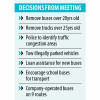Truck sales drop for lower demand

The sales of commercial vehicles, particularly heavy-duty trucks, fell nearly 22 per cent year-on-year in 2022 in Bangladesh due to their higher price, a surge in fuel costs and lower imports.
According to data from the Bangladesh Road Transport Authority, 4,528 units of trucks were registered in 2022, down from 5,789 units in the previous year.
"The decline in the sales of heavy-duty trucks points to the overall slowdown in the economy that started since the peak of the coronavirus pandemic in 2020," said Abdul Matlub Ahmad, chairman of Nitol Niloy Group, the distributor of Indian automobile giant Tata.
The sales of vehicles in the heavy-duty segment of Nitol Niloy Group have declined by 48 per cent.
According to the business leader, the operation cost of trucks has increased because of the price hike of diesel fuel.
Diesel costs Tk 109 per litre currently, up more than 36 per cent from Tk 80 in August.
"The operational expenditure has gone up but the fare of trucks has not increased in line with the fuel price increase," Matlub said.
He said the price of a Tk 20 lakh truck has surged to Tk 40 lakh.
As truck sales have declined drastically, its impact would be felt when the economy returns to normalcy, Matlub warned.
The demand for container movers, which contribute to export and import activities, came down to about 300 units per year, way lower than the average of 800 units seen during normal times.
Matlub admits that neither the government nor the business community has anything to do with the business slowdown since it has been the result of the global economic crisis, driven by the Russia-Ukraine war.
"The market is very dull due to the ongoing economic situation and there is no possibility for the situation to improve immediately," said Taskeen Ahmed, managing director of Ifad Autos, the sole distributor of Ashok Leyland of India.
Although Bangladesh posted higher-than-expected export growth, the sales of goods carriers like trucks and prime movers fell in 2022 compared to 2021.
The price of trucks and other commercial vehicles has gone up around 30 per cent due to the appreciation of the US dollar against the local currency, he said.
The taka has lost its value by about 25 per cent against the American greenback in the past one year owing to US dollar shortages.
With no end to the war in sight, Taskeen thinks the ongoing sales situation might prolong.
He said investors can't import necessary raw materials due to the squeezing scope for opening of letters of credit for non-essential products.
The central bank has tightened rules to discourage non-essential imports to protect the foreign currency reserves, which have declined by about 30 per cent since the war began.
"This has had visible impacts in different sectors such as truck and container movers," Taskeen said.
"As Bangladesh is an import-dependent economy, the business of trucks is related with import activities."
Custom-based imports decline by 2.20 per cent in the second half of 2022, while fresh opening of LCs fell 24.79 per cent during the period, central bank data showed.
Hafizur Rahman Khan, chairman of Runner Group, distributor of Eicher Truck of India, thinks that one of the main factors behind the drop in truck sales is the opening of the Padma bridge since operators can complete a trip within a very short of time.
Hossain Ahmed Mojumder, acting general secretary of the Bangladesh Truck and Covered Van Owners Association, said the truck operation is suffering seriously as the volume of the goods transported declined.
"The number of trucks is higher than the demand. So, our trucks are sitting idle at the truck stand everywhere in the country."
Mojumder is operating only three trucks out of his 11.
"If we don't do good business, how can truck sellers sell their products?"
He said operators are not getting expected trips from the business sector except the readymade garments industry.
"We face a loss of Tk 4,000 to Tk 8,000 per trip from Dhaka to Chattogram."
He also claimed that the fare did not increase in line with the price hike of diesel.
"Bus fares go up immediately when the fuel price increases. But nobody takes care of the goods transport sector."

 For all latest news, follow The Daily Star's Google News channel.
For all latest news, follow The Daily Star's Google News channel. 








Comments